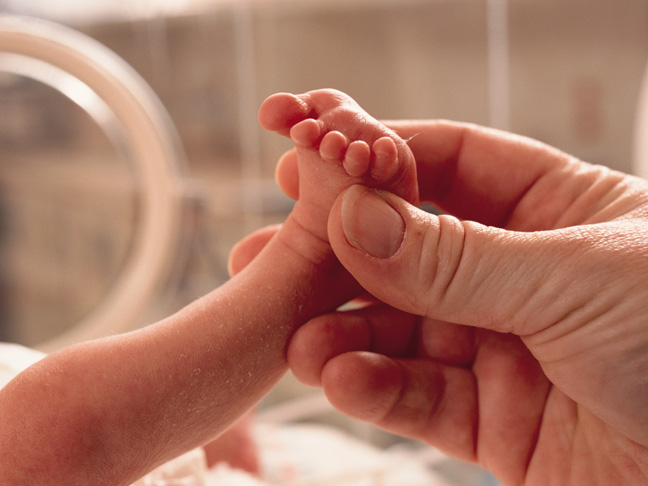When I found out I was pregnant with twins, I was concerned about delivering early. My doctor calmly reassured me that there was nothing I could do to prevent preterm labor, so I should maintain a positive attitude and take good care of myself. Knowing it was all out of my hands, I did my very best to just enjoy my pregnancy, and was lucky enough to carry my boys to term, delivering them when I was 38-weeks-pregnant.
Through my twins group though, I met many families who weren’t as lucky, and had delivered their twins very prematurely; some twins were so early they were considered micro-preemies. These parents credited excellent medical care, along with skin-to-skin contact (when they were finally able to hold their tiny preemies), for giving their children the best possible start.
Turns out, skin-to-skin contact has some very powerful benefits for babies, including weight gain, reduced pain, improved brain development, and a shorter hospital stay — all key to the long-term health of an extremely preterm baby. That’s why the Huggies No Baby Unhugged program is so amazing. In addition to educating parents about the power of hugs, it allows you to download a Hug Plan to give to your doctors, which prioritizes skin-to-skin contact and kangaroo care, when possible. Pretty helpful, since micro-preemies can spend months in the NICU.
Besides ensuring that your baby gets as much skin-to-skin care as possible, there’s a lot to know about very premature babies. What exactly is a micro-preemie? And what can you expect if you go into labor more than 13 weeks early? I spoke to expert neonatologists for answers.
What is a micro-preemie?
A micro-preemie is generally considered any baby born at less than 27 weeks gestation, or with a birth weight of less than 2 lbs, 3 ounces.
What causes a baby to be born before 27 weeks?
If you’ve had a previous preterm baby (as defined by a child born before 37 weeks of pregnancy), or you’re carrying multiples, there is an increased risk of delivering early, says Linda Wallen, MD, a neonatalogist at the University of Washington /Seattle Children’s Hospital. That aside though, there are several pregnancy complications that can lead to extremely preterm birth, according to Kristi Watterberg, MD, professor of pediatrics/neonatology at the University of New Mexico, and Chair of the American Academy of Pediatrics’ Committee on Fetus and Newborn.
- Pre-eclampsia
- Chorioamnionitis, an infection of the membranes and amniotic fluid
- A shortened cervix which painlessly dilates
- Gestational diabetes
- Placental problems
- Extreme stress
Is there anything you can do to prevent going into premature labor?
If preterm labor seems to be a risk, you’ll likely work with a fetal medicine specialist to prolong your pregnancy. “Every week that you can keep that baby in really helps,” says Dr. Wallen. “Doctors will prescribe progesterone treatments, either taken orally or vaginally, to delay labor, and will monitor you closely.” Once at the hospital, they’ll also want to speed up the development of your growing fetus, so before giving birth, you will be given steroid medications which stimulate your baby’s organs to mature more quickly, Dr. Wallen explains. You’ll also be given magnesium which helps with the brain development of your child.
How long do micro-preemies spend in the NICU?
Babies born before 27 weeks tend to stay in the NICU until their due date, often longer says Dr. Watterberg. While there, they often need help breathing as their lungs continue to develop, either with a ventilator, a CPAP (continuous positive airway pressure), or a high-flow nasal cannula, she explains. They might need help regulating their blood pressure with extra fluids or medication as well.
Primarily, NICU staff will be focused on nourishing your baby, as these micro-preemies will need to gain weight to support rapid growth of their organs, especially their brains. “The most important thing we do is provide them with adequate nutrition, starting with IV feedings, and then transitioning to mother’s breast milk, which is the best for the smallest babies,” says Dr. Wallen. “It’s often difficult for new moms in such a stressful environment to produce breast milk, so donor milk is often provided.”
Is there anything you can do to help your baby thrive while in the hospital?
During that time, parents often feel helpless, as though there’s nothing they can do to help their tiny babies. In truth though, a parents’ love and touch is essential for their survival. “Skin-to-skin care is crucial for the baby’s health because it helps to synchronize heart rates and calm breathing, which increases the baby’s oxygen saturation,” says Dr. Watterberg. “Not only that, but just sitting there under a warm blanket, holding and rocking your baby can be a stress reducer for both of you, and help boost milk production.”
New research is also starting to show the benefits of reading to your baby while in the NICU. “Many hospitals now have programs where they have parents read to their child for 15 minutes a day,” says Dr. Watterberg. “The interaction with your baby, even if it’s just hearing your voice, has shown to be beneficial to the growth of preterm babies.”
What is the long-term prognosis for micro-preemies?
Micro-preemies on the whole have a higher rate of learning disabilities, and more significant physical, mental, and emotional handicaps. “We see more cerebral palsy, cognitive problems like learning or behavioral problems, and sensory issues including blindness and deafness, than you would see in the general population,” says Dr. Wallen. “Having said that though, it’s hard to predict the outcome for an individual child, especially if they have access to early intervention programs.” She adds that outcomes improve with age as well; more kids are considered moderately or severely handicapped at age 2, than they are at 8.Why is that? Mostly because the testing done at age 2 is not as predictive of the eventual outcomes as tests done once they’re school-age. Also, many of these young children receive therapy services which contributes to improved skills.
Of course, having a micro-preemie is scary, and while the statistics may seem bleak, every child is different, and many premature babies end up thriving. With the right care there is plenty of reason to be optimistic about your micro-preemie’s future, says Dr. Watterberg. “If you hold your baby, read to your baby, and pay attention to her needs, making sure she gets the interventions she needs, you can be very hopeful.”
Photo: Getty








